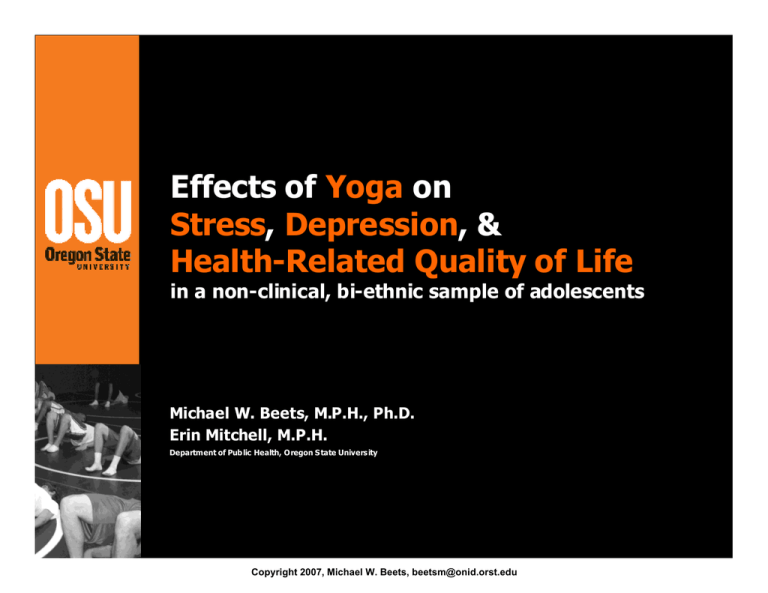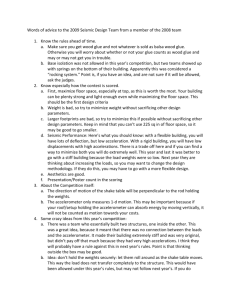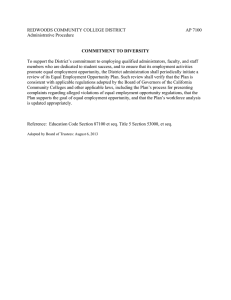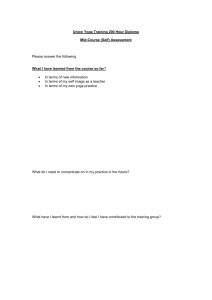Effects of yoga on stress, depression, and health-related
advertisement

Effects of Yoga on Stress, Depression, & Health-Related Quality of Life in a non-clinical, bi-ethnic sample of adolescents Michael W. Beets, M.P.H., Ph.D. Erin Mitchell, M.P.H. Department of Pub lic Health, O regon S tate Univers ity Copyright 2007, Michael W. Beets, beetsm@onid.orst.edu Mental Illness & Youth • One in 5 youth suffers from a Mental Illness (MI) (Costello et al., 1996, Offord et al., 1987) • 20% adolescents experience depressive disorder by end HS (Lewinsohn et al., 1993) • MI is associated with: • Early initiation and continuation of substance use/abuse ( Deas and Brown, 2006, Wu et al., 2006) • Engagement in risky sexual behaviors (Lehr er et al., 2006b) • Risk of being a victim of intimate partner violence (Lehr er et al., 2006) • Lasting effect on HRQL & depression (C hen et al., 2006; Pine et al., 1999, Reinher z et al., 2003) Copyright 2007, Michael W. Beets, beetsm@onid.orst.edu Care Seeking & Treatment • ~80% of all adolescents, ~88% of adolescents of Hispanic background with mental health needs DO NOT receive or seek professional treatment (Kataoka et al., 2002) • Non-drug modalities to treat MI gaining in popularity • Exercise-related treatments: (Larun et al., 2006, Guszkowska, 2005) • Generally inexpensive • Have little to no side-effects • May improve other health-related aspects (e.g., weight loss, lower blood pressure) (Larun et al., 2006) Copyright 2007, Michael W. Beets, beetsm@onid.orst.edu Yoga, Meditation, & Mindfulness • Used to treat PTSD & Pain ( NPR, Mar ch 1 2007) st • Associated with… • Increased HRQL (Oken et al., 2006) • Positive Affect ( Davidson et al., 2003) • Increased Immune Function ( Davidson et al., 2003) • Decreased depression, stress, anxiety (Kirkwood et al., 2005; Par shad, 2004; Pilkington et al., 2005 ; Woolery, Myers, Ster nlieb, & Zeltzer , 2004) • Biochemical & Physiological Mechanisms • Reduced sympathetic nervous tone, stimulation of the limbic system ( Riley, 2004) Copyright 2007, Michael W. Beets, beetsm@onid.orst.edu Purpose Evaluate the effect of practicing yoga within a school setting on adolescents’ mental health and HRQL Copyright 2007, Michael W. Beets, beetsm@onid.orst.edu Methods - Participants (Beets & Mitchell, in review) • 55 Students, 9th graders • 13.9±1.9yrs, 50% Girls, 49% Hispanic • Small, rural town (~3,163) Pacific Northwest • One high school • 4 week Intervention Copyright 2007, Michael W. Beets, beetsm@onid.orst.edu Methods - Intervention (Beets & Mitchell, in review) • Intervention • Certified yoga teacher with over 7yrs of practice and teaching experience • 2 Physical Education classes • 4 or 5, 45min Yoga sessions • Centering exercises • Process of accessing calm and focus by closing the eyes, drawing attention to the body and breath, and silencing the mind • 30 minutes of moderate level flow-style Hatha yoga • Gentle stretching of the muscles followed by a series of postures (e.g., backwards and forwards bends, shoulder, hip, and chest openers, and inversions) • 5-10min relaxation in the supine position Copyright 2007, Michael W. Beets, beetsm@onid.orst.edu Methods- Outcomes (Beets & Mitchell, in review) • Perceived Stress Scale (PSS) (Cohen et al., 1983) • • The Center for Epidemiological Studies Depression Scale (CES-D) (Radloff, 1977) • • 14 items Stress related to situations in one’s life (0 to 56) 20 items designed to detect depression in the general population (0 to 60) Health-Related Quality of Life (KINDL) (Ravens-Sieberer and Bullinger, 1998) • 24 items related to the health-related quality of life in adolescents’ everyday life (1 to 5) • Domains refer to (1) physical well-being, (2) emotional well-being, (3) self-esteem, (4) family, (5) friends, (6) school, and (7) overall score Copyright 2007, Michael W. Beets, beetsm@onid.orst.edu Methods- Analysis (Beets & Mitchell, in review) • 2 x 2 crossover design with a baseline measure • The primary contrasts of interest: (Ratkowsky et al., 1993) • • • Immediate (i.e., acute) and presence of a carryover effect (i.e., persistence of treatment effect after treatment removal) Random assignment of classes to Treatment Seq 1 or Seq 2 • Baseline, 2wks (2nd Baseline), & 2wks Yoga (Seq 1) • Baseline, 2wks Yoga, 2wks WD (Seq 2) pkcross (pharmacokinetic) commands in Stata 9.2 ( StataC orp, College Station, TX) • Parameter estimation calculated assuming no sequence effects existed Copyright 2007, Michael W. Beets, beetsm@onid.orst.edu Results (Beets & Mitchell, in review) • Acute effects • Overall HRQL KINDL scale • KINDL subscales: • Physical health, General feelings, Self-esteem • Perceived stress • Carry-over effect • KINDL subscales: • Self-esteem, Physical health, General feelings • Average effect size 0.39 and 0.46 Copyright 2007, Michael W. Beets, beetsm@onid.orst.edu Acute (2wk) and Carry-over (4wk) Effect Estimates Copyright 2007, Michael W. Beets, beetsm@onid.orst.edu 5 Significant Acute (Wk2) and Sequence 1 2 Carry-over Effect (Wk4) forSequence Self Esteem Seq 1: Baseline, Baseline, Yoga Seq 2: Baseline, Yoga, Withdrawl KIND L Self-Es te em (Range 1 to 5) 4 3 Seq 1: NS Seq 2: Sig Change Seq 1: Sig Change Seq 2: Sig Maintenance NS Baseline 2 1 Baseline Wk2 Copyright 2007, Michael W. Beets, beetsm@onid.orst.edu Wk4 5 Significant Acute (Wk2 & Wk4) Effect for Overall HRQL Seq 1: Baseline, Baseline, Yoga Seq 2: Baseline, Yoga, Withdrawl KINDL Total Scale (Range 1 to 5) 4 Seq 1: NS Seq 2: Sig Change 3 Seq 1: Sig Change Seq 2: NS Maintenance NS Baseline 2 1 Baseline Wk2 Copyright 2007, Michael W. Beets, beetsm@onid.orst.edu Wk4 Utility of Findings • Improved HRQL = reduction in antecedent symptomology of MI (depression) ( Dundon, 2006) • School-based Yoga program: • Effective in reducing stress • Increasing self-esteem • Low levels precursor to depression • Most youth attend school • Reach of program (RE-AIM framework) • Does not require substantial resources • Initial training and booster sessions Copyright 2007, Michael W. Beets, beetsm@onid.orst.edu Thank you Questions & Answers Copyright 2007, Michael W. Beets, beetsm@onid.orst.edu


